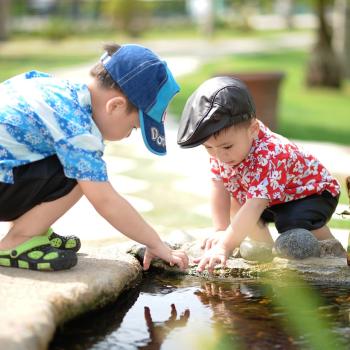
Our way of life is far from perfect on this side of eternity. The unmasked and naked truth about humans is that you and I consistently struggle with our old nature, which is nothing like our new nature in Jesus.
- We’re all broken.
- We all fail.
- We all cheat.
- We all lie.
- We all pretend.
- We all say one thing and do another.
All of us.
Of course, we don’t always fail, and we might even go an hour or two without sinning, but something eventually betrays our new and true identity as children of God. Admit it or not, we blow it every stinkin’ day. Our performance often falls short, whether it’s an unholy thought, a lustful look, or an unkind word. We regularly do something foolish that misses the mark of perfection.
What’s worse (and a bit crazy) is we still think we’re better than others. Our self-talk says, Okay, I might not be as good as Bill Graham, but I’m better than my sex-addict brother. I’m probably never going to be as perfect as Mother Teresa, but at least I’m not as messed up as that adulterer at work.
But we’re no longer naked and unashamed in Eden.

None of us is perfect. Not. One. Of. Us.
In truth, we’re all hiding something and still trying to cover our sin rather than own it.
As a Christ-follower, and because of what Jesus did on the cross, I don’t live bound by sin or trapped in hopelessness. I am a new creature in Christ. I am perfect in my position before God.
However, I am still far from perfect in my practice and day-to-day experience. I have a long way to go, and so do you.
Yes, we’re in a new Eden now—in a perfect relational place with God because of Jesus’ sacrifice. However, we still fail and then hide and pretend to be what we are not.
So, what should we do? How should we live?
Well, here’s a radical idea: Stop hiding.
If we all still sin (and we all do), why wouldn’t we step out of the darkness, own it, and confess our brokenness to one another? Why hide in the shadows when we can live free in the light? James, Jesus’ half-brother, said that confession is the path to healing (James 5:16).
Furthermore, if we all are still broken (and we are), why would we ever treat anyone like we are better than them? Why would we cast stones at others? And why do we get so irritated when someone lets us down as if we’ve never done the same or worse to many others?
Keith Giles asks another critical question: “Do we keep ourselves walled off from others because we don’t trust that we will be loved if people really knew all about us?”
If you spot it, you got it!
I had lunch with a friend some time ago. As we talked, it dawned on me that this guy had disappointed and failed me multiple times. Of course, he was probably thinking the same about me! The worst things I see in others are sometimes true about me. But during our conversation, I had an aha moment.
Jesus said, “Love one another as I have loved you” (John 15:12).
For decades, I’ve read that passage and stressed the importance of loving as Jesus loved: serving, caring, dying, being the bigger person . . . being like Jesus in my actions.
But what hit me in the face like a snowball out of nowhere is the context of this passage. Jesus said, “As I have loved you,” and the you (i.e., people) Jesus was speaking to in that text were a bunch of screwups.
- Traitors like Judas who loved money more than Jesus.
- Screwups like a couple of brothers who were constantly jockeying for power and position.
- The ultimate betrayer, Peter, also regularly stepped in a pile of manure.
Jesus was saying, “Love others who are imperfect. Love others who will fail you. Love others who let you down. Love others who are prone to failure and sin. Love the same way I loved you recovering idiots with a love not based on perfection or performance.”

Image by Petra from Pixabay
Years later, Peter would write, “Above all, love each other deeply, because love covers over a multitude of sins” (1 Peter 4:8). Whose sins? Yours and mine. Peter knew.
Of course, we want to be like Jesus in our character, but that means we get to love those whom Jesus loves—the messed up and broken. We don’t simply acknowledge imperfections; we choose to love others regardless of their glaring inadequacies. (Please read that last sentence one more time.)
If I haven’t already done so, at some point in the not-too-distant future, I will fail you (again). I will disappoint you (again). And by the way, the same is true about you.
We can get stuck in our disappointment, wallow in our frustration or love.
Apparently, God knew we would all struggle with sin, fail each other, and wound each other far too regularly.
Nevertheless, He calls us to love even when—especially when—we hurt and disappoint one another.
To love someone as Jesus loves us is to embrace the wrecked and say, “I love you, warts, wrinkles, failures, and all. And I will accept you the same way I am loved and accepted by the Father.”
I like what Crystal Raypole wrote in Healthline, “You don’t base your love on what someone does for you in return (i.e., their performance). You simply love them.”
To be clear, we should grow. We need to mature. We must get better. And our humanness can never be used as an excuse to rationalize or justify any sin against another. Of course, sin matters.

Image by Photo Mix from Pixabay
But love matters more.
Why?
- Because without love, nothing changes, and no one grows.
- Without love, there is no hope of maintaining a lasting relationship with anyone.
- Without love, we might as well give up on people now who will eventually let us down.
As another guy who was far from perfect once wrote, “Let all you do be done in love” (1 Corinthians 16:14). Sadly, when some of us hear the word love, we hear blah, blah, blah. (If you’re still reading this article, I applaud you.) Nonetheless, love must be greater than other people’s undeniable brokenness and indisputable failures. Let love transcend your hurts. Find someone who has failed you (it won’t be hard), look them in the eye, and say, “You matter to me no matter what.”
Bear with each other and forgive one another
if any of you has a grievance against someone.
Forgive as the Lord forgave you.
And over all these virtues put on love.
Colossians 3:13-14 (NIV)

















